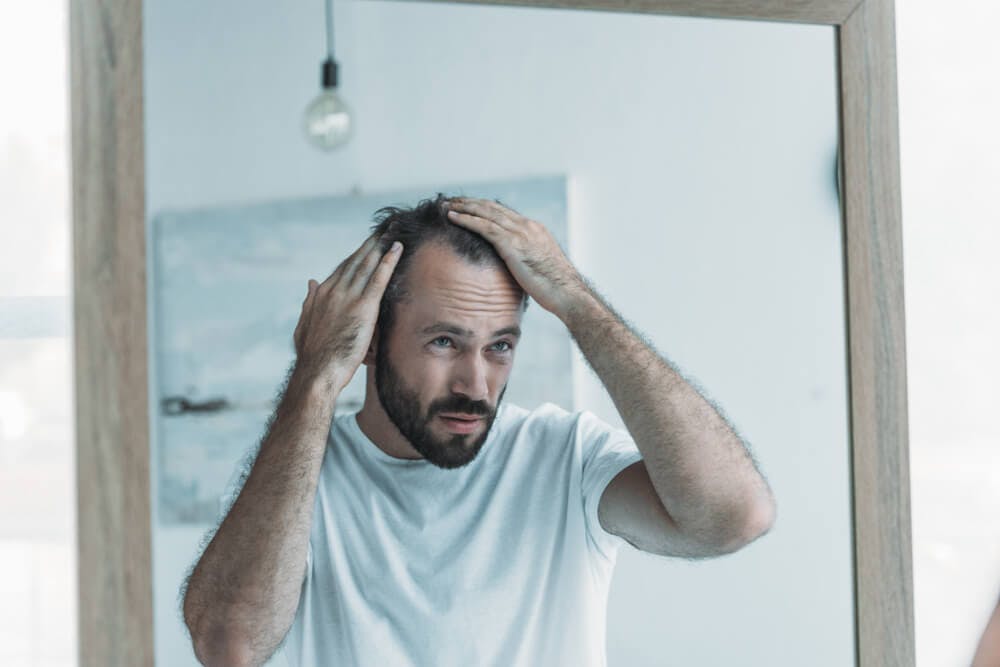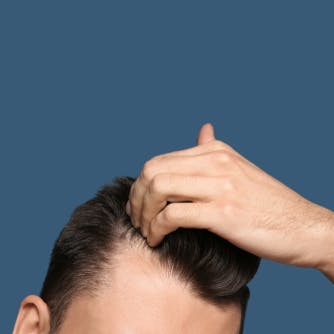What are the different types of hair loss?
There are several types of hair loss, and the most common[2] are:
- Androgenic alopecia;
- Alopecia areata;
- Telogen effluvium; and
- Anagen effluvium
The most prevalent kind, androgenetic alopecia, is hereditary. It can happen to anyone, so it is often called male or female pattern hair loss. After puberty, men can suffer from hair loss symptoms that can worsen later. In a woman’s scalp, hair typically gets thinner over time, with the hairline usually not receding.[3]
Alopecia areata is an autoimmune disease, which means that the body’s immune system attacks healthy hair follicles. This stops new hair from growing and makes hair fall out, though it doesn’t typically hurt. It typically presents with discrete bald patches on the scalp.[6] Meanwhile, telogen effluvium happens when hair falls out quickly and in a short time. It happens a few months after something physically or emotionally stressful happens to the body.[7]
Those who suffer from anagen effluvium, on the other hand, lose hair quickly because of medical treatments, like chemotherapy. In that case, these strong and fast-acting drugs kill cancer cells but may also stop hair growth in the scalp and other parts of the body.[8]
Other things that cause hair loss include fungal infection (tinea capitis), inflammation (cicatricial alopecia), hair shaft abnormalities, and little hair growth (hypotrichosis).[9]
If you ever are concerned about bald spots, sudden hair thinning, and other hair fall symptoms, or if you are just curious about it, talk to our doctors at Mosh. You can begin by answering our short online questionnaire, and our doctors can reach out within twenty-four hours with personalised recommendations. With us, you can also learn more about how to achieve faster hair growth.
Is there a way to prevent thinning hair?
Yes, there are preventive ways that you can try for falling and thinning hair issues. Consult our platform, where Mosh doctors are happy to discuss your hair loss concerns, including how to make hair grow faster.
Although you can’t stop all kinds of hair loss, there are solutions to keep your hair healthy and lessen the amount you lose. Prevention is better than cure, so as not to lose hair, you can:[10]
- Try a cooling cap if you are ever to undergo chemotherapy;
- Wear hairstyles that don’t pull your hair tightly;
- Get enough calories, protein, and iron from the food you eat;
- Figure out a way for stress management; and
- Take care of illnesses that cause hair loss.
Note that even some mental health conditions are related to loss of hair. Anxiety might also affect one’s hair growth.[11]
If your hair loss isn’t caused by something in your genes, there are ways to address it.[12] Hair loss due to menopause, pregnancy, smoking, stress, or other lifestyle or medical conditions can be stopped and, in some cases, reversed.[13]
One way to manage hair loss is to manage your stress, such as by working out and taking time to relax. It’s critical to find ways to cope with stress, especially if you’re going through a major event like the death of a loved one or the end of a relationship, so that you don’t lose your hair as a result of it.[14]
Eating a lot of healthy proteins, omega-3 fatty acids, and fresh fruits and vegetables can also help you stop hair loss. Iron, biotin, vitamin D, vitamin C, and zinc are nutrients that can help you keep your hair from falling out. It’s always a good idea to consult your doctor before beginning any new vitamins or supplements.[15]
Meanwhile, one must also be careful with heat-styling equipment, including curling tongs, crimping irons, and hair straighteners. If you’re used to using heat tools to style your hair every day, there’s a chance of risk that your hair may appear glossy on the exterior but be damaged and dry on the inside.[16]
Your hair loses moisture and melanin when exposed to high heat because the outer cuticle layer protecting it from the exterior factors is destroyed. This can result in hair loss by making your hair dry, brittle, dull, and frizzy.[17]
The condition could be temporary or permanent, depending on what causes hair loss. But no worries; if a regrowth is required, there are options available for you. As your doctors are the only ones who can recommend treatment or medication, you should first consult them.
Talk with Mosh doctors, who are passionate about men’s health; they have spoken with a lot of Australian men about issues like hair loss, sexual health, and skincare. Every doctor is Australian and is licensed by the AHPRA, and you can connect with them online so that you can be more comfortable speaking about your concerns; no more long waits or awkward waiting rooms.
What regrowth treatments are available for hair loss?
How to grow hair faster is one thing, and regrowing it is another. There are treatments available for hair growth; addressing the underlying condition that is causing your hair loss will be required.[18]
One option you can talk to your doctor about are topical treatments that stimulate hair development and encourage hair growth.[19] As there are different strengths and formulations, it’s best to consult with a medical professional before trying these types of treatments.
Hair transplant or restoration surgery can also be a possibility, wherein you can make the most of the hair you still have. During a transplant, a dermatologist or cosmetic surgeon takes hair from a part of the head where there is hair and moves it to a place where there is no hair.[20] However, hair transplants are considered invasive and not all individuals may qualify for this procedure.
At Mosh, we can work together to help you with what causes hair loss. Our doctors can provide recommendations for your situation, and if needed, they can create a custom treatment plan for you.
If you opt for our subscription plans, there are unlimited doctor’s consultations, free delivery, flexible payments options, and absolutely no lock-in contracts. We’ll even be able to provide automatic refills as needed, so you no longer have to worry about running out.
You can even ask your doctor about which oil is best for hair growth or which vitamin deficiency causes hair loss.
Talk to a Mosh doctor about your hair loss concerns whenever you’re ready.

